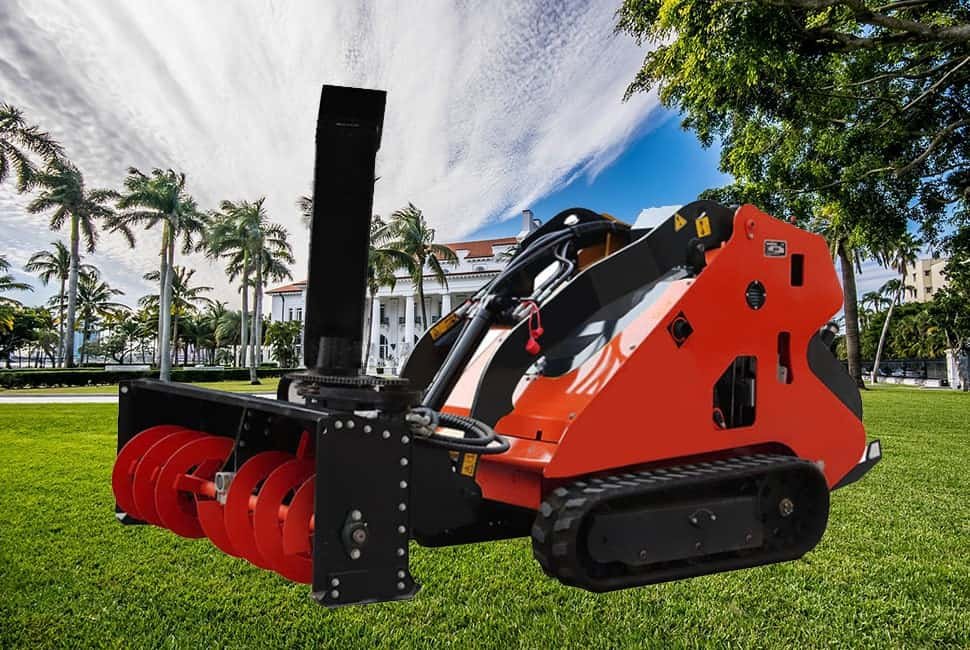Choosing between a 2WD and a 4WD tractor can be challenging, as each offers distinct advantages and disadvantages. Making the wrong choice may lead to decreased operational efficiency, increased fuel consumption, and reduced productivity. This article provides a comprehensive comparison to assist you in making an informed decision.
2WD tractors are generally more cost-effective and suitable for flat terrains and lighter tasks, offering better fuel efficiency and maneuverability. In contrast, 4WD tractors provide enhanced traction and power, making them ideal for rugged terrains and heavy-duty operations. Your choice should align with your specific land conditions, budget, and operational requirements.
Let’s delve deeper into the differences between 2WD and 4WD tractors to determine which is best suited for your needs.
2WD vs 4WD Tractor Difference: What Do They Mean?
A 2WD, or Two-Wheel Drive, tractor channels power exclusively to its rear wheels. This setup is well-suited for operations on flat or gently sloping terrain. It is often the go-to choice for tasks that do not demand substantial traction, such as mowing lawns or performing light tilling. The simplicity and efficiency of 2WD tractors make them a practical option for many routine agricultural and landscaping jobs.
On the other hand, a 4WD, or Four-Wheel Drive, tractor disperses power evenly across all four wheels. This feature significantly enhances traction and stability, making the tractor far more capable in challenging conditions. Whether navigating hilly, muddy, or uneven fields, a 4WD tractor can handle the task with ease. It is also the preferred choice for heavy-duty operations, such as plowing tough soil or hauling substantial loads. The added power and grip provided by a 4WD tractor ensure that it can tackle the most demanding jobs with confidence.
Four-Wheel Drive Meaning: What Does 4WD Actually Do?
The term “Four-Wheel Drive” (4WD) describes a drivetrain system that powers all four wheels at the same time. This setup offers significantly better traction than traditional two-wheel drive systems.
In tractors, 4WD systems provide a major advantage by allowing the machine to maintain a firm grip on surfaces that are slippery or uneven. By distributing power to all four wheels, these tractors can dramatically reduce wheel slippage, which in turn boosts their overall efficiency. This enhanced traction is especially valuable in challenging conditions, such as wet fields or steep inclines, where keeping the wheels firmly planted is crucial for both safety and performance.
2WD vs 4WD: Which Is Better for Your Needs?
Choosing between a 2WD and a 4WD tractor largely depends on your specific agricultural needs and the environmental conditions of your farm.
If you are managing a small-scale farm with mostly flat terrain and lighter tasks, such as mowing or light tilling, a 2WD tractor might be the perfect fit. These tractors are generally more cost-effective and offer greater maneuverability, making them ideal for navigating tight spaces and performing routine tasks efficiently.

However, for larger farming operations that involve heavy-duty tasks like plowing tough soil, hauling heavy loads, or working on challenging terrains such as hilly or muddy fields, a 4WD tractor is the way to go. With its enhanced power and superior traction, a 4WD tractor can handle these demanding conditions more effectively, ensuring that your operations run smoothly and efficiently.
Pros and Cons of 2WD Tractors
Two-Wheel Drive (2WD) tractors are often favored for their simplicity and cost-effectiveness. However, it’s crucial to carefully weigh their advantages against potential limitations to determine if they are the right choice for your needs.
Advantages of 2WD Tractors:
- Lower Purchase Price: 2WD tractors are generally more affordable upfront, making them an attractive option for those on a budget.
- Reduced Maintenance Costs: With simpler mechanics, 2WD tractors require less maintenance, which can save you both time and money in the long run.
- Better Fuel Efficiency: Their lighter weight means they use less fuel compared to their 4WD counterparts, resulting in lower operating costs.
- Superior Maneuverability: 2WD tractors are more agile and easier to handle, especially in tight spaces or around obstacles. This makes them ideal for tasks that require precise navigation.
Potential Limitations of 2WD Tractors:
- Limited Traction: 2WD tractors rely solely on their rear wheels for power, which can be a disadvantage on hilly or slippery terrains. They may struggle to maintain traction, leading to wheel slippage and reduced efficiency.
- Heavy-Duty Tasks: While 2WD tractors are well-suited for lighter tasks, they may not be powerful enough for heavy-duty operations like plowing tough soil or hauling heavy loads. Pushing them beyond their intended capacity can lead to increased wear and tear, potentially shortening the tractor’s lifespan and increasing repair costs.
Ultimately, the choice between a 2WD and 4WD tractor should be based on a thorough assessment of your specific farming needs, the terrain of your land, and the types of tasks you need to perform.
Pros and Cons of 4WD Tractors
While 4WD tractors offer enhanced capabilities, they come with considerations that may impact your decision

Advantages of 4WD Tractors:
- Superior Traction: The primary advantage of 4WD tractors is their ability to provide superior traction. This makes them highly effective on challenging terrains such as hilly, muddy, or uneven fields. They can perform heavy-duty tasks like plowing tough soil or hauling heavy loads with greater efficiency and reliability.
- Enhanced Stability and Control: 4WD tractors offer better stability and control, reducing the risk of wheel slippage and associated accidents. This enhanced stability is particularly beneficial in adverse conditions, ensuring that your tractor remains firmly planted and safe to operate.
- Универсальность: With their powerful drivetrain, 4WD tractors can handle a wide range of tasks, from routine field work to more demanding operations. This versatility makes them a valuable asset for larger farming operations or those with diverse terrain.
Considerations for 4WD Tractors:
- Higher Purchase and Maintenance Costs: 4WD tractors are generally more expensive to purchase due to their complex drivetrain systems. Additionally, the maintenance costs are higher because these systems require more specialized care and parts.
- Increased Fuel Consumption: 4WD tractors tend to consume more fuel compared to 2WD tractors. This is primarily due to their increased weight and the higher power demands of their drivetrain. The additional fuel consumption can add to your operating costs over time.
- Complexity and Weight: The complex drivetrain and additional weight of 4WD tractors can make them less maneuverable in tight spaces compared to 2WD tractors. This might be a consideration if your farm has many confined areas or requires frequent navigation around obstacles.
Ultimately, the decision to choose a 4WD tractor should be based on a careful evaluation of your specific farming needs, the terrain your of land, and your budget. While 4WD tractors offer significant benefits in terms of traction and versatility, they also come with higher costs and increased fuel consumption.
Does 4WD Use More Gas?
Fuel consumption is a crucial factor to consider when deciding between a 2WD and a 4WD tractor.
Generally, 4WD tractors tend to use more fuel compared to 2WD tractors. This higher fuel consumption is primarily because 4WD tractors need extra power to drive all four wheels simultaneously. Additionally, the added weight of the 4WD system itself contributes to the increased fuel usage. Essentially, the more complex drivetrain and the heavier overall weight of a 4WD tractor demand more energy to operate, leading to higher fuel costs.

However, it’s important to note that in challenging conditions—such as hilly, muddy, or uneven terrains—4WD tractors can actually be more efficient. Their superior traction allows them to maintain better grip and avoid wheel slippage, which can save fuel in the long run. In these situations, the enhanced performance of a 4WD tractor might compensate for its higher fuel consumption, making it a more cost-effective choice overall.
2WD and 4WD Tractors: Cost Comparison
Understanding the financial implications of your choice is crucial for long-term operational planning and overall cost management.
Cost Considerations for 2WD Tractors:
- Lower Initial Purchase Price: 2WD tractors are generally more affordable upfront, making them an attractive option for those looking to minimize initial investment.
- Reduced Maintenance Costs: Their simpler design means fewer moving parts and less complexity, which translates to lower maintenance costs over time. Routine upkeep and repairs are typically less expensive and less frequent.
- Better Fuel Efficiency: 2WD tractors are lighter and have simpler drivetrains, which contribute to better fuel efficiency. This can lead to significant savings on fuel costs, especially over extended periods of use.
- Lower Operational Expenses: Overall, the combination of lower purchase price, reduced maintenance, and better fuel efficiency results in lower operational expenses, making 2WD tractors a cost-effective choice for many users.
Cost Considerations for 4WD Tractors:
- Higher Initial Investment: 4WD tractors come with a higher price tag due to their more complex drivetrain systems and enhanced capabilities. This higher initial cost can be a significant consideration for many buyers.
- Increased Maintenance and Fuel Costs: The complexity of 4WD systems means higher maintenance costs. Additionally, their greater weight and power demands lead to higher fuel consumption, which can add to operational expenses.
- Enhanced Productivity and Potential Returns: Despite the higher costs, 4WD tractors offer superior traction and stability, making them ideal for heavy-duty tasks and challenging terrains. This enhanced performance can lead to greater productivity and potentially higher returns on investment, especially in scenarios where their capabilities are fully utilized.

In summary, while 2WD tractors offer lower initial costs and operational expenses, 4WD tractors provide enhanced capabilities that can lead to greater productivity and potentially higher returns in the right conditions. The choice between the two should be based on a careful assessment of your specific needs, operational environment, and long-term financial goals.
Final Decision: Which Tractor Should You Choose?
Your decision should be carefully aligned with your specific operational needs, environmental conditions, and budget constraints.
If your work primarily involves light tasks on flat terrains and you prioritize cost and fuel efficiency, a 2WD tractor may be the ideal choice. These tractors are known for their affordability, lower maintenance costs, and better fuel efficiency, making them a practical option for routine tasks and smaller-scale operations.
However, if you frequently operate on challenging terrains, such as hilly, muddy, or uneven fields, or if you require a machine capable of handling heavy-duty tasks like plowing tough soil or hauling heavy loads, investing in a 4WD tractor would be highly beneficial. The enhanced traction, stability, and power of a 4WD tractor can significantly improve your operational efficiency and productivity in these demanding conditions.
In conclusion, both 2WD and 4WD tractors offer unique advantages and come with their own set of limitations. A thorough assessment of your specific requirements, operational environment, and budget will guide you to the most suitable choice for your farming or landscaping needs. By carefully considering these factors, you can make an informed decision that maximizes both performance and cost-effectiveness.

